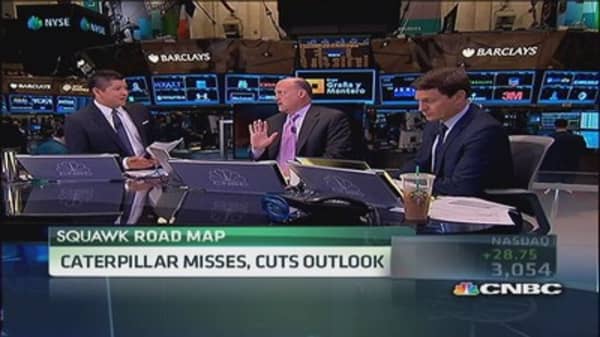Earnings season thus far has been steady as she goes: A healthy amount of profit beats against dramatically lowered expectations, coupled with virtually no sales growth and diminished outlooks.
Companies have been rewarded and penalized on an individual basis, with market participants more interested in forward-looking prospects than rear-window past-quarter performance.
Negative outlooks are beating positive about 2 to 1. Financials and consumer discretionary are faring best overall, while materials and information tech are getting clobbered.
While it seems on the surface, at least, that corporate America and the investors that prop it up are betting big on a second-half recovery that may not happen, there also appear to be few catalysts to bring about the long-awaited market correction.
(Read more: 'Walking Dead' market: Why the rally keeps going)
The S&P 500 has surged more than 18 percent this year, with its only meaningful pullback a late-May to late-June panic over fears that the Federal Reserve might pull the plug on cheap money earlier than expected.
Beyond that, the market seems perfectly willing to ignore profit reports that signal a dismal quarter behind and uncertain prospects ahead.
"Without financial sector earnings, the S&P results would look poor by most comparisons and would've most likely meant a correction for stocks," said Jared Levy, senior equity strategist at Zack's Investment Research.
"But in a world of algorithms, (exchange-traded funds) and quants, it all comes down to the cumulative earnings in the index and the results of the most heavily weighted companies," he added. "The markets continue to look ahead to the latter half of this year with an extremely optimistic viewpoint and for now it's working."
(Read more: Market bear: Stock shorting has become impossible)
That's the broad take.
For a more specific look, Brian Sozzi, CEO at Belus Capital Advisors, offers 16 key points:
1. Surprising positives in the industrial complex (which has been underowned by investors). I think this is a function of analyst estimates assuming a continued leg lower in European demand from the challenging first quarter. However, broadly speaking, European demand conditions are being described as "stabilizing."
2. Global multinationals have continued to find ways to reduce costs (UTX had a few positive surprises, ditto GE).
3. Exposure to the U.S. auto market still preferable (strength in this sector seen everywhere from Snap-On Tools to the railroad operators).
4. Group that continues to underwhelm: semiconductors (TXN).
5. UPS and Ryder didn't come out and slash guidance, but they didn't inject enthusiasm on the global economy in the second half of the year. UPS and FedEx clearly have structural issues in their businesses (shift to slower moving, lower priced shipping solutions and reduced package weight) that will make it necessary to aggressively slash costs for the remainder of 2013 (UPS has now begun that, FDX started summer 2012).
6. I chatted with Chipotle Tuesday evening, digging its plan to remove GMO from its offerings (by doing so, believe higher prices could be charged longer term), and think that awareness amongst consumers of this will truly help set the brand apart in 2014 (products will be reformulated, in most instances).
7. China's economic growth has obviously moderated, be on the watch for profit-killing excess inventories. The rule of thumb is that a company needs 2-3 quarters to normalize its inventory levels when supply/demand is misaligned.
8. Keep it simple on Apple: the company has to shed light on when profit growth stands to grow again, and that only happens with greater clarity on fundamentally transformative products (watch, TV, etc.). That light remains a bit dim for my investment selection preferences.
9. S&P 500 = has logged 23 new highs in 2013.
10. Congrats Discover, you delivered net interest margin expansion in a low rate environment. Take that banks!
11. Yeah, Norfolk Southern the railroad had weak pricing. True story (railroads have consistently shown robust pricing gains).
12. Apple's quarterly unit/revenue breakdown table, decoded: textbook market share loss (prices down in all areas).
13. McDonald's said its unable to raise prices to an extent they keep pace with CPI. No good. I am beginning to ponder if the company will have to acquire a casual dining establishment to reignite growth, which would be ironic seeing as it spun off Chipotle a few years ago.
14. Panera shares are headed lower post earnings. Whenever I hear a restaurant operator note that it's having "throughput" issues, it's a signal they will have to implement new processes that constrain profit margins.
15. VF Corp has no expectations built into its guidance for harsh winter weather (which would cause retailer reorder activity). Upside to 4Q13 numbers quite possibly.
16. I have a sell rating on Aeropostale for clients, but the stock continues to act well. We could very easily land a sell-side upgrade pre-August earnings on optimism regarding new, trendier merchandise assortments. To me, Aeropostale's years of product disappointment and overexposure to core basics remain fundamental issues that will require time to correct (and in the meanwhile keeps margin risk elevated).





